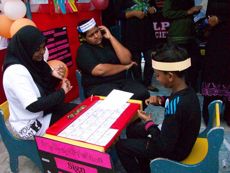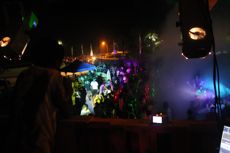The Environment Ministry has ‘called out’ presidential candidates for making election pledges that threaten the environment, amidst civil society calls for government authorities to support NGOs’ sustainable development initiatives.
Environment Minister Dr Mariyam Shakeela noted that no policy on environmental protection has been articulated by candidates despite their numerous election pledges during her speech at the “NGO Forum on Environment and Sustainable Development 2013” held by the Environment Ministry and NGO Federation yesterday (May 5).
“Although all political parties are currently talking about their plans to govern the country for the next five years, none of their manifestos include policies on protecting the environment,” local media reported Shakeela saying.
“When you deeply consider these policies, I certainly haven’t heard of any plans to protect the environment. But on the other hand, we keep hearing of plans that can seriously threaten the environment of the Maldives,” she added.
Shakeela stated that despite the economic benefits which could be gained from finding oil or establishing a mariculture industry, these policies could pose grave threats to the environment, according to local media.
“Sometimes, although these plans gain a short-term gain, or some amount of money, they may cause great damages in the long run. It is very important that we give this due consideration,” said Shakeela.
Shakeela emphasised that civil society must hold the Maldivian government and policy-makers accountable when they “veer off course” and endanger the environment.
“Regardless of who prepares it, if the plans are such that they may harm the environment, it is the role of the civil society organizations to be vigilant over such matters and try to stop them,” declared Shakeela.
She also stressed that civil society organisations must identify the environmental threats posed by such policies on the behalf of Maldivian people.
The opposition Maldivian Democratic Party (MDP) has pledged to develop a mariculture industry in the country should former President Mohamed Nasheed be reelected in September 2013.
The potential for developing a domestic oil industry was launched as a campaign issue during a January 14 speech by Progressive Party of the Maldives (PPM) presidential prospect, MP Abdulla Yameen.
Leader of the government-aligned Jumhoree Party (JP), business tycoon MP Gasim Ibrahim, has also vowed to find oil in the Maldives should he be elected president.
NGOs issue government recommendations
The NGO forum was held to facilitate environmental protection discussions between civil society organisations, as well as implementation of sustainable development methodologies and policies.
“This is the only forum of this kind. Civil society did not previously get the opportunity to come together and discuss these issues,” NGO Federation President Ahmed Nizam told Minivan News yesterday (May 6).
Many NGOs work on environmental issues at the island and national level – particularly conducting advocacy and awareness programs – however they do not conduct adequate work on environment and sustainable development, according to forum participants.
Participants highlighted ongoing issues that narrow the opportunities available for Maldivian NGOs, which include legal challenges as well as government administrative procedures. NGOs also lack access to resources, such as well educated people and finance.
Given these limitations, the 15 participating civil society organisations presented a list of recommendations to the government, in line with the forum’s theme of enhancing NGO engagement in environmental governance and management.
The forum recommended the government provide NGOs with equal opportunities and “reveal their stand” to the organisations.
Participants also recommended the Environment Ministry establish a separate focal point to engage with NGOs and provide a common room for civil society organisations within the “green building” currently under construction for the ministry. Research grants for NGOs and environmental studies students should also be provided.
Organisations further recommended the government include NGO representatives in all delegations from the Maldives attending environmental and sustainable development meetings. These organisations also requested the government provide Maldivian NGOs opportunities to participate in environmental and sustainable development projects.
“Minister Shakeela’s response to the recommendations was very positive. She pledged to do everything possible to implement the recommendations,” said Nizam.
“However, she also said certain things might not be possible to implement immediately due to budget and planning constraints,” he added.
Nizam explained that the NGO Federation plans to take the discussion forum to a “different level” by ensuring dialogue and collaboration on environmental protection and sustainable protection continues.
He emphasised that the NGO Federation aims to hold conferences annually or biannually and will continuously seek improvement and additional NGO participation.
The Maldivian NGO Federation held a follow-up workshop today on NGO capacity building for advocating environmentally sustainable development, a project funded by UNDP’s Global Environment Facility, Small Grants Programme.


